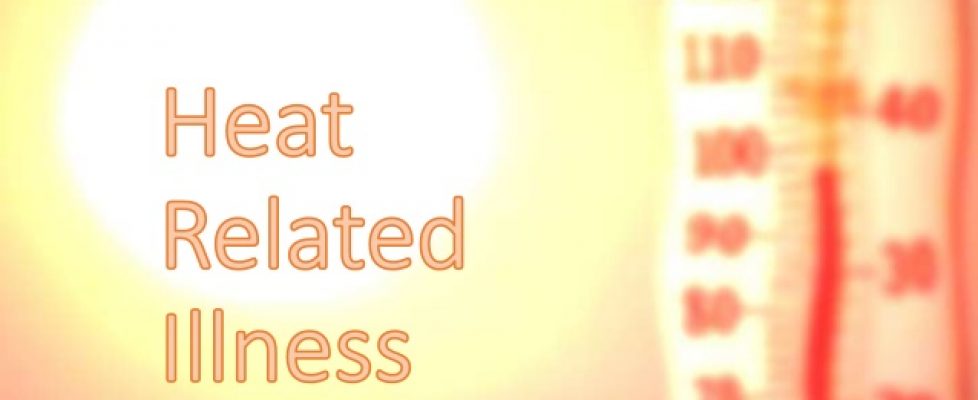Weather Alert! Heat Related Illnesses
CHARLOTTE NC MAY 17 2017
Heat illnesses among the public safety and private security fields are always a great concern during the summer months and can effect a person quickly and without much warning.
Temperatures in several states have already hit the high 90 mark during the past week even though spring is still in full swing and even hotter weather is expected.
Weather forecasts say we will see several upcoming days that will be “summer-like” with temperatures in some states hitting 100 degrees with extreme humidity and Ozone/Air Quality warnings.
Heat-related illnesses and injuries are common not just among children and the elderly, it can happen to anyone. When temperatures outside start pushing 90 degrees or higher, you need to protect yourself.
There are several heat related illnesses that can be life-threatening.
So what are considered heat-related injuries or illnesses?
Sunburns:
Sunburns are the most common type of heat-related injury. Symptoms include redness, pain, possible swelling, blisters, fever, and headaches.
Sunburns can occur even on partly cloudy days or when a person is not in direct sunlight.
In order to treat sunburn, you need to take a shower with soap to remove oils that may block pores and prevent the body from cooling naturally.
If blisters occur; apply dry, sterile dressings and get medical attention.
Aloe Vera gels and lotions and many after sun products, can also help.
Heat Cramps:
Heat cramps are typically caused when you are dehydrated. Symptoms include painful spasms in your leg and abdominal muscles, and heavy sweating.
This should not be ignored or considered to be a non-priority illness because it can develop into a more serious emergency.
To relieve heat cramps, get to a shaded area or a cool room. Apply firm pressure to cramping muscles and/or gently massage to relieve the spasm. You may also use damp, cooled cloths on the areas to cool down the skin. Take sips of water, don’t guzzle it down. If nausea occurs, discontinue and seek immediate medical attention.
Heat Exhaustion:
Heat exhaustion is a result of your body overheating. On a scale with heat cramps being mild and heat stroke being severe, heat exhaustion is more moderate but serious. It occurs when you’re exposed to heat for a longer period of time, and may develop suddenly or overtime. It is usually accompanied by dehydration.
Symptoms include heavy sweating; weakness; and skin that is cold, pale, and clammy. It’s possible that your body temperature is normal despite the symptoms. Symptoms also include rapid pulse, fainting, and vomiting.
To treat heat exhaustion, lie down in a cool place and loosen your clothing. Apply cool, wet cloths to your face and body. Use a fan directly on yourself or turn on the air conditioning.
Take sips of water, but if nausea occurs, discontinue. If vomiting occurs, seek medical attention immediately.
Heat Stroke (Sun Stroke)
Heat stroke is on the severe end of the scale. Symptoms include a high body temperature of 106 degrees or higher with hot, dry skin. You’re likely to experience a rapid pulse and possible unconsciousness. You’ll likely also not sweat.
In case of heat stroke, call 911 and/or get to a hospital immediately. Delay can be deadly.
You should move to a cooler environment, and get into a cool bath to reduce body temperature. Remove clothing carefully, and use fans and/or air conditioners to cool off. DO NOT DRINK ANYTHING.
Untreated heatstroke can quickly damage your brain, heart, kidneys and muscles. The damage worsens the longer treatment is delayed, increasing your risk of serious complications or death.
So as temperatures rise and the sun’s rays become more brutal, make sure that you’re staying cool and hydrated.
To prevent heat related illness and fatalities:
- Drink water every 15 minutes, even if you are not thirsty.
- Rest in the shade to cool down.
- Wear a hat and light-colored clothing.
- Learn the signs of heat illness and what to do in an emergency.
- Keep an eye on fellow workers.
OSHA’S Heat Safety Tool
https://www.osha.gov/SLTC/heatillness/heat_index/heat_app.html
Rick McCann
Founder-CEO
EMTP /FF
Chief Medical Instructor
Police Chief
Private Officer International
Armour College-Technical Institute




